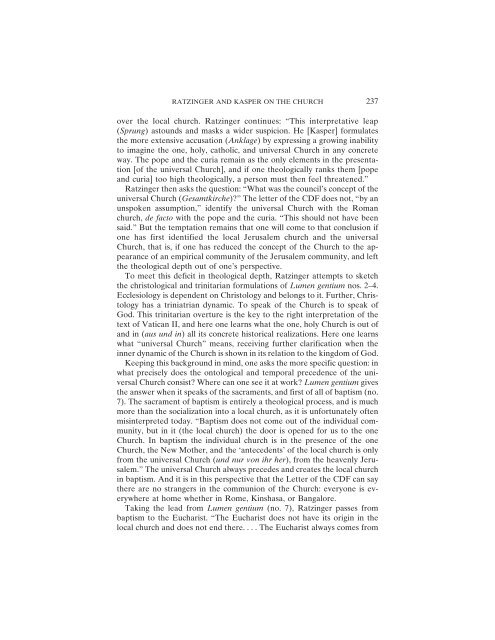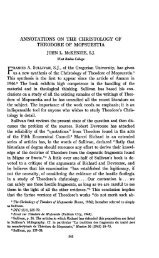the ratzinger/kasper debate - Theological Studies
the ratzinger/kasper debate - Theological Studies
the ratzinger/kasper debate - Theological Studies
Create successful ePaper yourself
Turn your PDF publications into a flip-book with our unique Google optimized e-Paper software.
RATZINGER AND KASPER ON THE CHURCH<br />
over <strong>the</strong> local church. Ratzinger continues: “This interpretative leap<br />
(Sprung) astounds and masks a wider suspicion. He [Kasper] formulates<br />
<strong>the</strong> more extensive accusation (Anklage) by expressing a growing inability<br />
to imagine <strong>the</strong> one, holy, catholic, and universal Church in any concrete<br />
way. The pope and <strong>the</strong> curia remain as <strong>the</strong> only elements in <strong>the</strong> presentation<br />
[of <strong>the</strong> universal Church], and if one <strong>the</strong>ologically ranks <strong>the</strong>m [pope<br />
and curia] too high <strong>the</strong>ologically, a person must <strong>the</strong>n feel threatened.”<br />
Ratzinger <strong>the</strong>n asks <strong>the</strong> question: “What was <strong>the</strong> council’s concept of <strong>the</strong><br />
universal Church (Gesamtkirche)?” The letter of <strong>the</strong> CDF does not, “by an<br />
unspoken assumption,” identify <strong>the</strong> universal Church with <strong>the</strong> Roman<br />
church, de facto with <strong>the</strong> pope and <strong>the</strong> curia. “This should not have been<br />
said.” But <strong>the</strong> temptation remains that one will come to that conclusion if<br />
one has first identified <strong>the</strong> local Jerusalem church and <strong>the</strong> universal<br />
Church, that is, if one has reduced <strong>the</strong> concept of <strong>the</strong> Church to <strong>the</strong> appearance<br />
of an empirical community of <strong>the</strong> Jerusalem community, and left<br />
<strong>the</strong> <strong>the</strong>ological depth out of one’s perspective.<br />
To meet this deficit in <strong>the</strong>ological depth, Ratzinger attempts to sketch<br />
<strong>the</strong> christological and trinitarian formulations of Lumen gentium nos. 2–4.<br />
Ecclesiology is dependent on Christology and belongs to it. Fur<strong>the</strong>r, Christology<br />
has a triniatrian dynamic. To speak of <strong>the</strong> Church is to speak of<br />
God. This trinitarian overture is <strong>the</strong> key to <strong>the</strong> right interpretation of <strong>the</strong><br />
text of Vatican II, and here one learns what <strong>the</strong> one, holy Church is out of<br />
and in (aus und in) all its concrete historical realizations. Here one learns<br />
what “universal Church” means, receiving fur<strong>the</strong>r clarification when <strong>the</strong><br />
inner dynamic of <strong>the</strong> Church is shown in its relation to <strong>the</strong> kingdom of God.<br />
Keeping this background in mind, one asks <strong>the</strong> more specific question: in<br />
what precisely does <strong>the</strong> ontological and temporal precedence of <strong>the</strong> universal<br />
Church consist? Where can one see it at work? Lumen gentium gives<br />
<strong>the</strong> answer when it speaks of <strong>the</strong> sacraments, and first of all of baptism (no.<br />
7). The sacrament of baptism is entirely a <strong>the</strong>ological process, and is much<br />
more than <strong>the</strong> socialization into a local church, as it is unfortunately often<br />
misinterpreted today. “Baptism does not come out of <strong>the</strong> individual community,<br />
but in it (<strong>the</strong> local church) <strong>the</strong> door is opened for us to <strong>the</strong> one<br />
Church. In baptism <strong>the</strong> individual church is in <strong>the</strong> presence of <strong>the</strong> one<br />
Church, <strong>the</strong> New Mo<strong>the</strong>r, and <strong>the</strong> ‘antecedents’ of <strong>the</strong> local church is only<br />
from <strong>the</strong> universal Church (und nur von ihr her), from <strong>the</strong> heavenly Jerusalem.”<br />
The universal Church always precedes and creates <strong>the</strong> local church<br />
in baptism. And it is in this perspective that <strong>the</strong> Letter of <strong>the</strong> CDF can say<br />
<strong>the</strong>re are no strangers in <strong>the</strong> communion of <strong>the</strong> Church: everyone is everywhere<br />
at home whe<strong>the</strong>r in Rome, Kinshasa, or Bangalore.<br />
Taking <strong>the</strong> lead from Lumen gentium (no. 7), Ratzinger passes from<br />
baptism to <strong>the</strong> Eucharist. “The Eucharist does not have its origin in <strong>the</strong><br />
local church and does not end <strong>the</strong>re. ...TheEucharist always comes from<br />
237

















